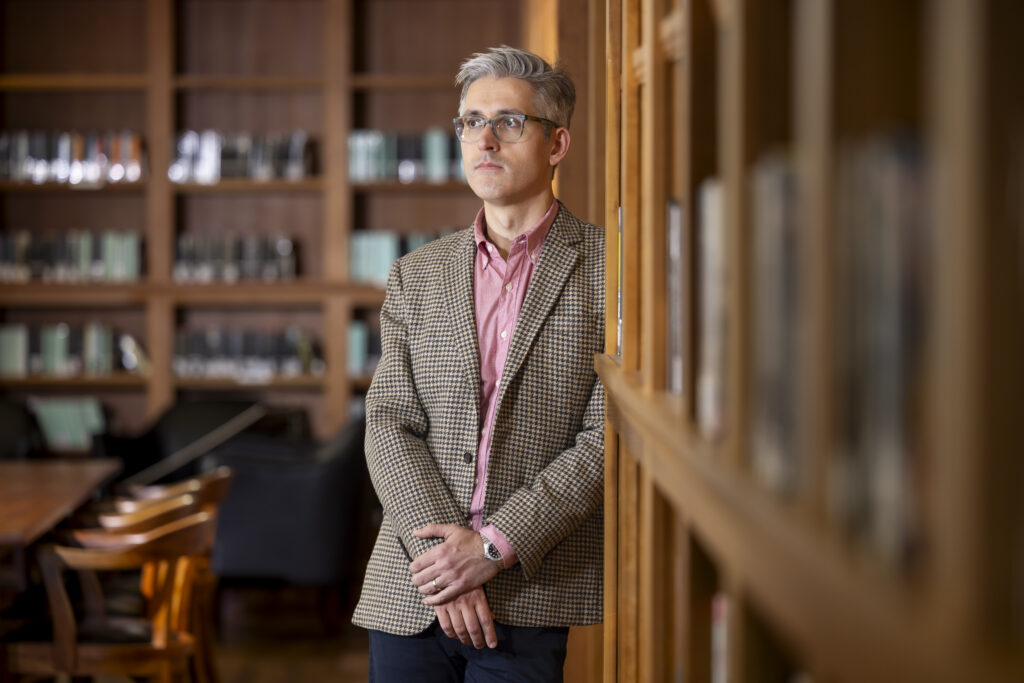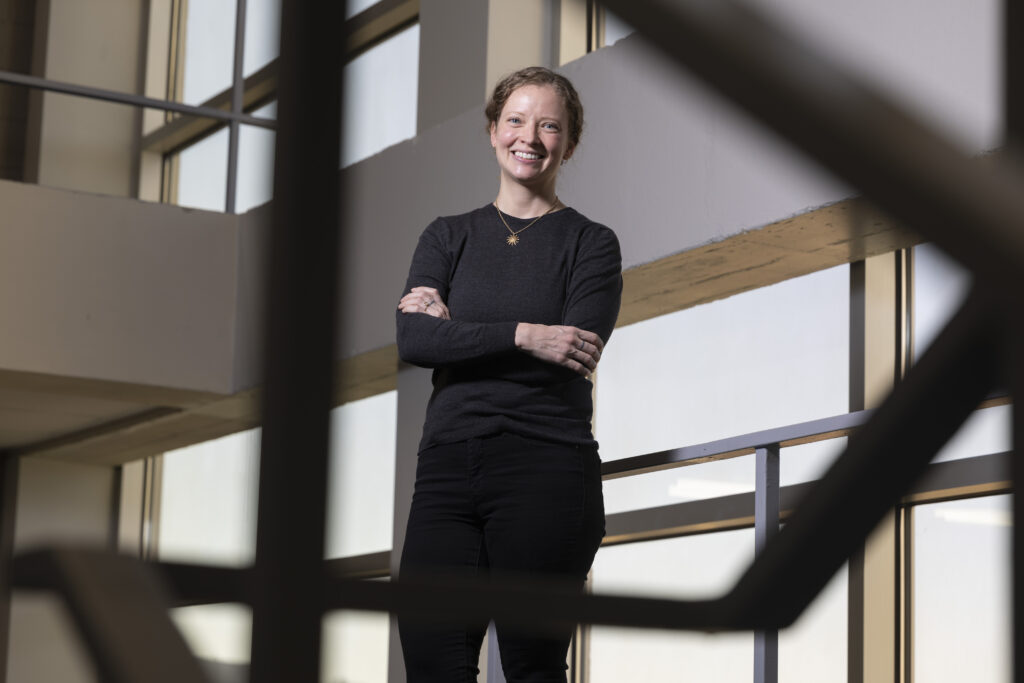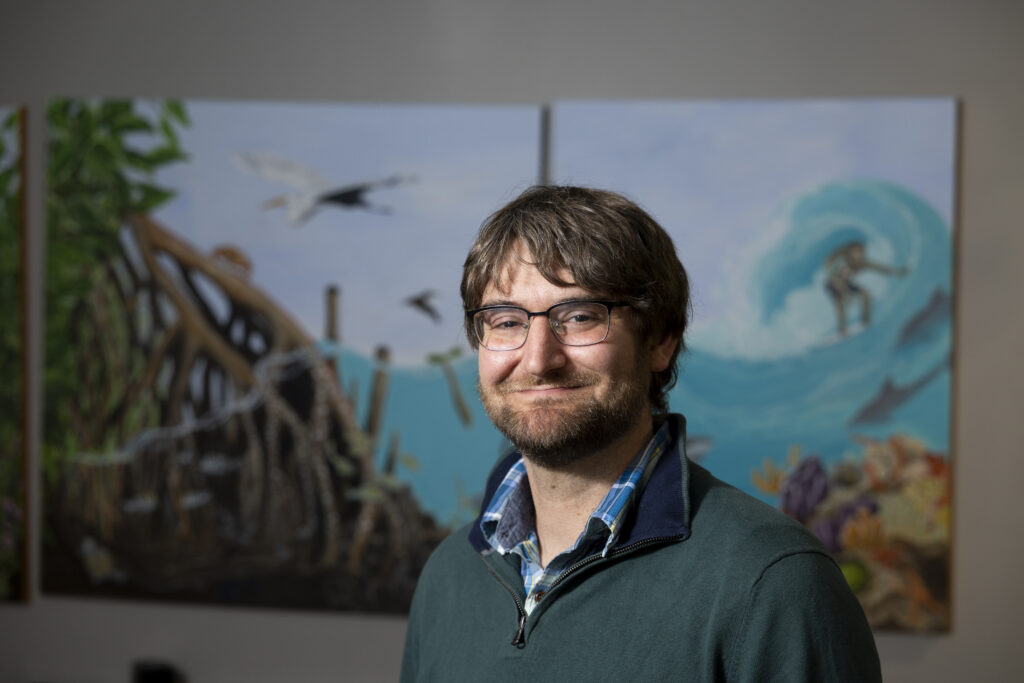Three UGA faculty members received a Russell Award for Excellence in Undergraduate Teaching. Russell Awards recognize outstanding teaching by faculty early in their academic careers. Award recipients receive $10,000. The Richard B. Russell Foundation in Atlanta supports the program.

Harrison Frye
Associate Professor
Department of Political Science
School of Public and International Affairs
Harrison Frye encourages his students to respectfully disagree with each other.
“I teach normative political theory, or issues surrounding how we should organize our society. This means I teach material that is subject to profound disagreement,” he said.
Frye has three basic goals for his classes. First, he wants students to understand the complexity of many of the difficult issues that surround larger societal questions like whether people should obey the law. Second, he wants students to understand viewpoints with which they disagree. Third, he wants students to learn how to write clear papers that explain and cogently defend their positions, which builds their ability to communicate clearly.
To meet those goals, Frye uses a few different methods, including regular writing assignments. He limits his lecturing, instead opting for a Socratic approach, where he asks students questions about the material being covered so that they get used to talking and working through complex ideas in their own words. He also utilizes small-group work. For example, in his course on moral progress, he engages students in a semester-long project where they identify a moral problem within their local community and then propose a solution for that problem.
Frye has taught 13 undergraduate courses at UGA. One of those is a course he developed that provides an overview of the ethical questions surrounding the market as a way of organizing economic life and what role the state plays in managing both the market and businesses.
“The power of Dr. Frye’s pedagogical approach is in his ability to connect political theory, a daunting and abstract topic for many political science students, to real-world applications,” one former student wrote.
That approach has already earned Frye the SPIA Excellence in Teaching Award.
“He is a teacher’s teacher who fosters learning through structured argumentation and logic — an effective approach that his students will remember for the rest of their lives,” one colleague wrote.

Glenna Read
Associate Professor
Department of Advertising and Public Relations
Grady College of Journalism and Mass Communication
Glenna Read wants to make a positive impact on the educational and professional outcomes of her students.
“My student-centered teaching philosophy focuses on the creation of engaging, novel and rigorous experiences to help undergraduate students achieve their goals in educational and professional realms,” she said. “My teaching philosophy means that my work is never done; I will constantly strive to innovate and work to improve the educational outcomes for undergraduate students.”
One course Read continually strives to innovate is Media Strategy and Activation. The purpose of this course is to work through the process of creating a media plan, introducing students to a side of advertising that they may not have known existed.
She first redesigned the course through the Center for Teaching and Learning’s Active Learning Summer Institute in 2021. In subsequent redesigns, she gamified the media ratings math so that students compete to solve problems using key formulas.
“Dr. Glenna Read embodies the qualities of an exemplary educator — expertise, dedication and genuine concern for her students’ growth and success,” one former student wrote. “Her impact on her students extends far beyond the classroom, leaving a lasting impression that shapes their academic and professional trajectories.”
Read has published and presented her research with undergraduate co-authors. Additionally, she has served as a CURO mentor for several students, encouraging research conducted by undergraduates.
Read is also the founder and director of the college’s Brain, Body, and Media (BBAM) Lab. The lab supports research, often conducted by undergraduate researchers under Read’s supervision, that examines psychophysiological responses to media and messages. In the lab, researchers can attach sensors to subjects to track how they respond to audio and visual stimuli.
“She goes above and beyond to ensure that her courses provide the best and most engaging educational experiences for undergraduate students possible,” one colleague
wrote.

Alexander Strauss
Assistant Professor
Odum School of Ecology
Alexander Strauss hopes to prepare his students for environmental challenges to come.
“I am confident that I am helping train the next generation of diverse scientists,” he said. “I am passionate about playing my role as best I can, both in the classroom and as a program director and mentor of undergraduate research.”
Strauss takes an active learning approach to teaching his students. He has taught and redesigned three of the four core courses ecology majors must take.
An example is Strauss’ flagship course, Population and Community Ecology. He’s implemented a partially-flipped classroom with scaffolding problem sets to develop computer coding and data analysis skills, the “jigsaw” method for paper discussions, and individual white boards for students to derive equations and sketch graphs during in-class activities, among other active learning methods. He also designed and implemented a laboratory section for this course that provides students with additional experience collecting, analyzing and interpreting ecological data.
Strauss also thoroughly redesigned his Freshwater Ecosystems course and lab by incorporating a three-week wet lab and data analysis learning module and replacing traditional exams with synthesis writing assessments. He also added a lab and data analysis learning module to his Population Biology of Infectious Disease course.
Those efforts are just part of the reason Strauss was named a Lilly Teaching Fellow and received an Outstanding Teaching Faculty Award from the Odum School of Ecology.
“Dr. Strauss clearly cares about the well-being of his students, and his passion for the material was also evident. He did a very good job of showing how what we were learning is relevant to many aspects of ecology and even everyday life,” one former student wrote.
Strauss’ dedication to mentorship outside the classroom also shows. In the four years that he has been at UGA, 10 of his undergraduate mentees have received CURO research awards.
“It is clear that Dr. Strauss deeply values teaching and training students and that he builds a sense of mutual respect between himself and students in his research lab and classes,” one colleague wrote.


